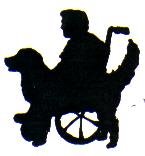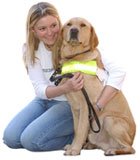
Social Acknowledgments for Children with Disabilities: Effects of Service Dogs
JSTOR: Child Development: Vol. 60, No. 6 (Dec., 1989), pp. 1529-1534
Social Acknowledgments for Children with Disabilities: Effects of Service Dogs Bonnie Mader, Lynette A. Hart, Bonita Bergin Child Development, Vol. 60, No. 6 (Dec., 1989) , pp. 1529-1534
Abstract
While service dogs are known to perform important tasks for people using wheelchairs, such as retrieving dropped items or pulling a wheelchair, they may also serve as an antidote for social ostracism. Adults in wheelchairs have been found to receive many more social acknowledgments when a service dog is present than when not. This study examined whether disabled children in wheelchairs with service dogs receive more frequent social acknowledgment than when no dog is present. Behaviors of passersby in response to children in wheelchairs were recorded in shopping malls and on school playgrounds. In both settings, social acknowledgments (e. g., friendly glances, smiles, and conversations) were substantially more frequent when a service dog was present. Social effects of the dog were more pronounced in shopping malls, typical of unfamiliar settings where the child would be likely to experience being ignored or overlooked. Service dogs may assist in normalizing the social interactions for children with disabilities producing social isolation.


